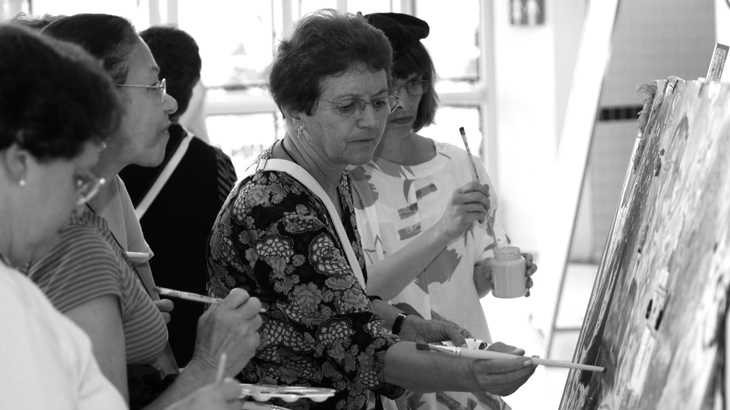Postado em
Grupos sociais: instrumento na manutenção da saúde do idoso?

| Para acessar a integra da publicação, clique aqui |
ANA CRISTINA SOARES MELO (1)
CLÁUDIA FERREIRA MELO (2)
RESUMO
O presente artigo, com base em referencial teórico em gerontologia e acerca do desenvolvimento humano, busca compreender os efeitos do envelhecer sobre o idoso. Atenta principalmente no que se refere aos grupos sociais que voltam sua atenção para a condição do idoso e como esses grupos contribuem para a manutenção da saúde dessa faixa etária. Analisa também como estes influenciam nos impactos sociais, físicos e psicológicos. Com esse estudo se verificou que os grupos sociais promovem a seus integrantes o estabelecimento de novos laços afetivos e a qualificação dos antigos. A convivência social modifica os envolvidos, desenvolve potencialidades, além de ser um importante veículo para o enfrentamento dessa fase da vida, melhorando a capacidade de recuperação e manutenção do comportamento adaptativo e podendo apresentar considerável estabilidade e autoestima. Os grupos são ferramentas que possibilitam ao sujeito uma melhor qualidade de vida subjetiva na velhice, estimulando uma vida social mais sadia, desenvolvendo a cultura, o sentimento de utilidade nas relações familiares e sociais. E permitindo aos idosos ter mais controle sobre suas vidas. Além de propiciar momentos de lazer, os grupos sociais possibilitam ao sujeito que os integra a oportunidade de resgatar valores como ser humano e de construir novas identidades sociais, alterando assim as expectativas em torno desse momento da vida.
Palavras-chave: envelhecimento; saúde; grupos sociais.
ABSTRACT
This article was written aiming at understanding the effects of aging on the elderly based on theoretical background in gerontology and human development. It especially focuses on the impact of social groups formed by older people on its participants and how these groups contribute to maintaining their health. It also analyzes how such groups influence the social, physical and psychological environments around them. The analysis showed that these social groups encourage their members to establish new affection bonds and qualify the previous ones they already had. The social interaction modifies the individuals involved, develops their potentialities, besides being an important means of tackling the challenges at this stage of life. It improves resilience and maintenance of adaptive behavior, and may provide considerable stability and self-esteem. The study has shown that these groups are tools that give the individuals opportunities to develop a better subjective quality of life in old age, encouraging them to have a healthier social life, developing their general knowledge about culture, their feeling of usefulness within their families and social relationships, allowing seniors to have more control over their own lives. Besides providing leisure time, the social groups allow the people who integrate them the opportunity to redeem values as human beings, to construct new social identities, changing their expectations at this time in life.
Keywords: aging; health; social groups.
(1) Acadêmica do Curso de Psicologia da Faced – Sociedade Dom Bosco de Educação e Cultura do Ano de 2013.
(2) Psicóloga, especialista em Gerontologia Social, mestre em Educação, Cultura, Organizações Sociais e docente orientadora.








